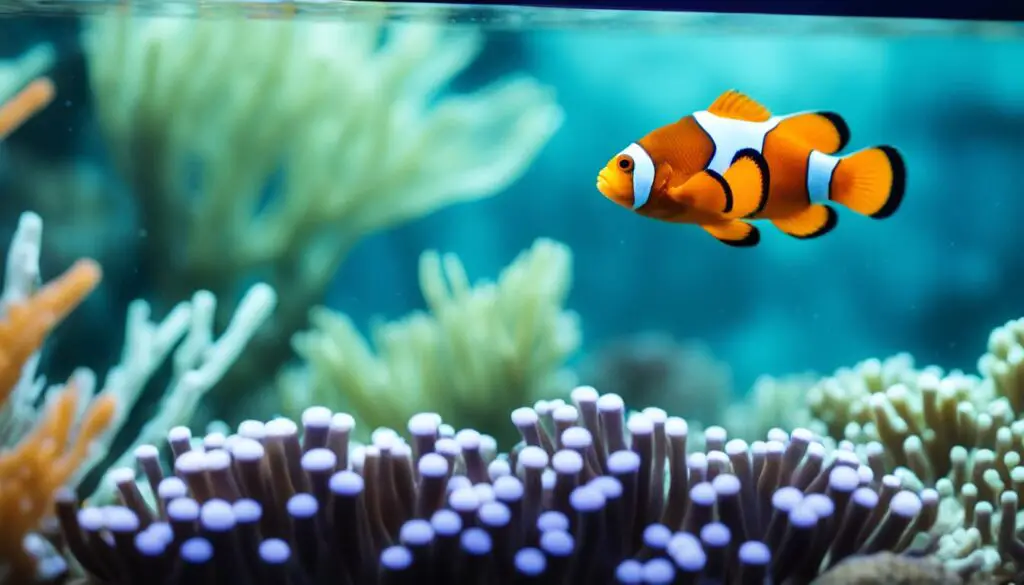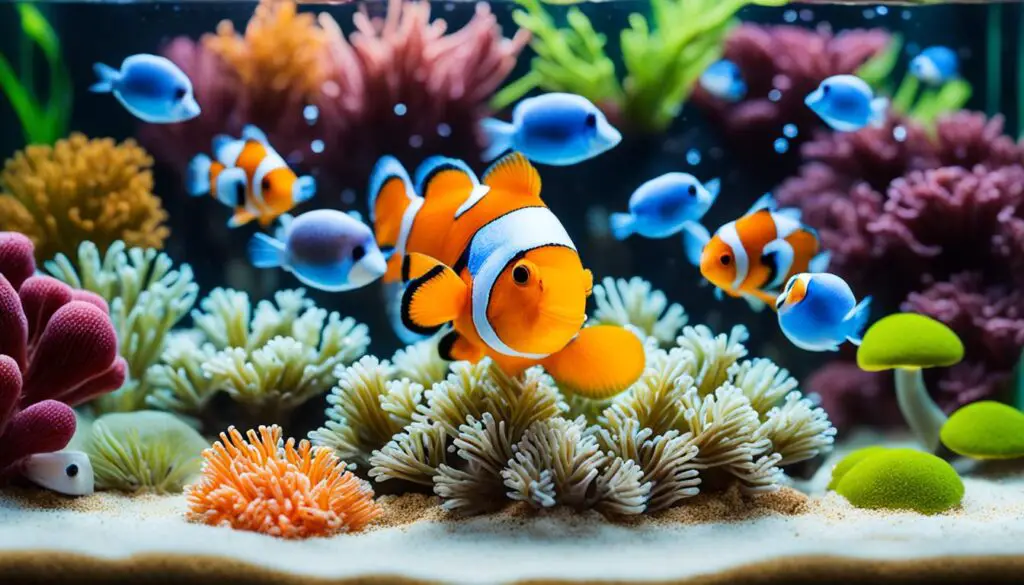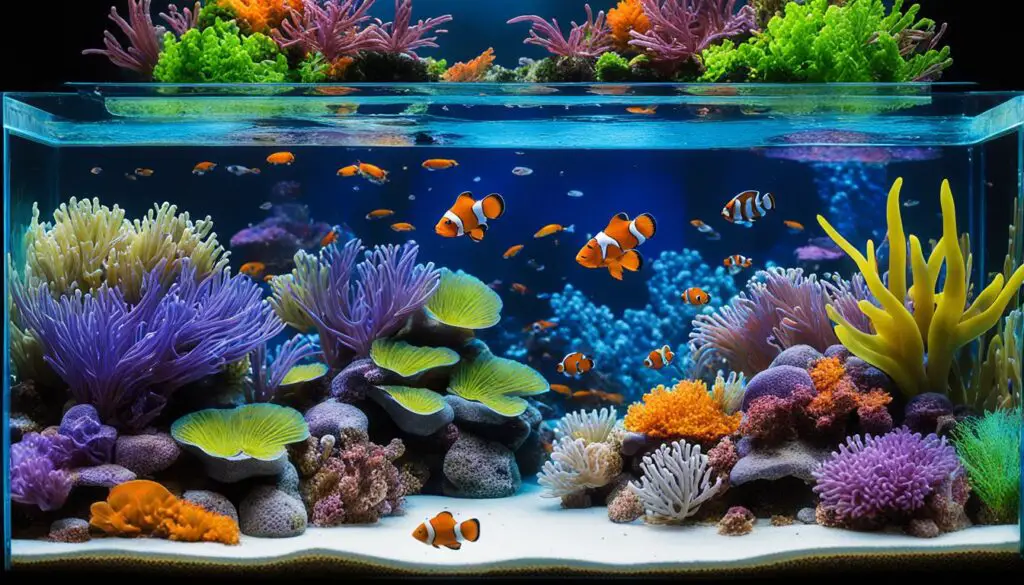Going Green with DIY Filtration Solutions
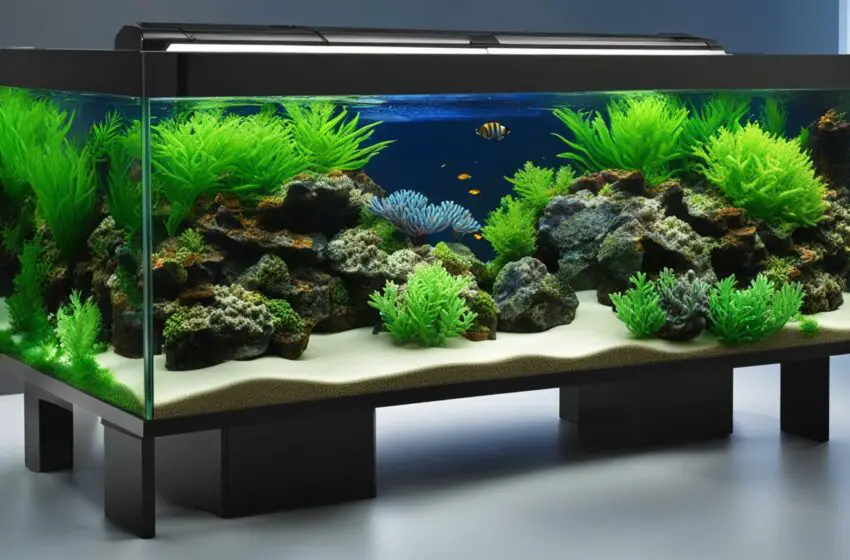
As a marine life enthusiast, I’ve always been passionate about maintaining a sustainable and healthy environment for my marine aquarium. That’s why I started exploring energy-efficient marine aquarium filtration systems that are not only effective but also sustainable in the long run. In my search for eco-friendly options, I discovered the power of DIY filtration solutions.
DIY water filters offer a sustainable and affordable alternative to traditional filtration systems. By using common household materials, these DIY filters can effectively remove impurities and contaminants, ensuring a clean and healthy environment for marine life.
What makes DIY filtration solutions even more appealing is their ability to reduce waste and minimize energy consumption. With conscious choices during construction and maintenance, you can go green without compromising the well-being of your marine life.
Key Takeaways:
- DIY filtration solutions are a sustainable and cost-effective option for marine aquariums.
- These filters use common household materials to remove impurities and contaminants.
- By making conscious choices, you can minimize waste generation and energy consumption.
- DIY filtration solutions promote a healthier and more sustainable environment for marine life.
- Exploring eco-friendly options like DIY filtration is a step towards a greener future.
Assessing the Environmental Impact of DIY Water Filters
While DIY water filters provide an affordable and accessible solution to accessing clean drinking water, it is crucial to assess their environmental impact. Factors such as waste generation, energy consumption, and water usage should be considered when evaluating the sustainability of DIY filters.
One way to minimize waste generation is by using biodegradable or compostable filter materials. These materials break down naturally over time, reducing the amount of waste that ends up in landfills or adversely affects the environment. By opting for eco-friendly filter materials, we can contribute to a greener future.
Compared to traditional filtration systems, DIY filters have a lower energy consumption. They do not rely on electricity to operate, making them more energy-efficient and reducing our carbon footprint. This energy-saving aspect aligns with our goal of creating a greener future.
Implementing water-saving techniques in the construction of DIY filters can also have a positive environmental impact. By designing systems that use water efficiently and avoid unnecessary wastage, we ensure the responsible and sustainable use of this invaluable resource.
| Factors to Consider | DIY Water Filters | Traditional Filtration Systems |
|---|---|---|
| Waste Generation | Minimized by using biodegradable or compostable filter materials | May produce plastic waste from disposable filters |
| Energy Consumption | No reliance on electricity, resulting in lower energy consumption | May require electricity for operation |
| Water Usage | Can implement water-saving techniques during construction | May have higher water requirements |
By consciously evaluating and addressing the environmental impact of DIY water filters, we contribute to a greener future. Making informed choices about filter materials, minimizing waste generation, and reducing energy consumption and water usage, we can ensure that DIY filters remain an eco-friendly option for accessing clean drinking water.
Environmental Benefits and Drawbacks of DIY Filtration Methods
When it comes to eco-friendly options for water filtration, DIY methods offer several environmental benefits. These cost-effective solutions utilize readily available and affordable materials, such as activated charcoal and ceramic, reducing the reliance on commercial filtration systems. By adopting DIY filtration methods, individuals can contribute to a greener future by:
- Reducing Plastic Waste: DIY filters eliminate the need for disposable plastic filter cartridges, helping to reduce plastic waste and its detrimental impact on the environment.
- Lowering Carbon Footprint: The use of eco-friendly materials and the absence of electricity in DIY filtration methods results in a lower carbon footprint compared to traditional filtration systems.
However, it’s important to remember that DIY filters have certain limitations and drawbacks. These include:
- Ineffectiveness in Removing Certain Contaminants: DIY filters may struggle to effectively remove certain contaminants such as bacteria, viruses, heavy metals, or chemicals. It’s essential to consider the specific water quality requirements and contaminants present before opting for a DIY filtration method.
- Lack of Standardized Testing and Verification: Unlike commercial filtration systems, DIY filters often lack standardized testing and verification procedures. This makes it challenging to ensure consistent water quality and safety.
- Time-Consuming Maintenance: DIY filtration methods may require more regular maintenance compared to commercial systems. This could involve frequent cleaning, filter replacement, or adjustments to ensure optimal performance.
Understanding both the benefits and drawbacks of DIY filtration methods is crucial before implementing them. By doing so, individuals can make informed decisions about their water filtration needs while considering their environmental impact.
Eco-Conscious DIY Water Filtration Systems: An Overview
Eco-conscious DIY water filtration systems offer a range of options for individuals looking to reduce their environmental impact while accessing clean drinking water. Examples include activated carbon filters, ceramic filters, and reverse osmosis systems. These systems use materials like activated carbon and ceramic to remove impurities and bacteria from water sources.
One popular eco-friendly DIY water filtration system is the activated carbon filter. It is designed to remove chlorine, sediments, and organic compounds from water, improving taste and odor. Activated carbon has a large surface area, allowing it to effectively trap impurities through adsorption.
| Filtration System | Advantages |
|---|---|
| Activated Carbon Filter |
|
Another eco-friendly option is the ceramic filter, which utilizes a porous ceramic material to filter out impurities, bacteria, and parasites. This type of filter is easy to clean and has a long lifespan, reducing the need for frequent replacements.
Reverse osmosis systems are also commonly used in eco-conscious DIY water filtration. These systems use a semi-permeable membrane to remove dissolved solids, salts, and contaminants from water. While they have a high initial cost, reverse osmosis systems provide excellent filtration results and produce clean, purified water.
DIY filtration systems provide a cost-effective and eco-friendly alternative to commercial systems. By utilizing natural materials and simple construction methods, individuals can reduce their carbon footprint and contribute to a more sustainable future.
It is important to match the filtration method to specific water quality requirements. For example, activated carbon filters are effective at removing chlorine and improving taste, while ceramic filters excel at removing bacteria and parasites. Considering ongoing maintenance needs is also essential, as certain systems may require more frequent cleaning or replacement of filter elements.
Overall, eco-conscious DIY water filtration systems offer several advantages, including:
- Cost-effectiveness
- Customizability
- Reduced carbon footprint
By choosing the right filtration method and implementing regular maintenance, individuals can have access to clean drinking water while minimizing their impact on the environment.

The Berkey Water Filter: An Eco-Friendly Option
When it comes to accessing clean drinking water, the Berkey water filter stands out as an eco-friendly and sustainable option. Unlike traditional filtration systems, the Berkey water filter offers several advantages that make it a reliable choice for those looking to minimize their environmental impact.
Made from durable stainless steel, the Berkey water filter is built to last. This not only reduces the need for frequent replacements but also eliminates the use of plastic alternatives that contribute to pollution and waste. By choosing the Berkey water filter, you’re making a conscious decision to invest in a product that is both durable and environmentally responsible.
Not only is the Berkey water filter durable, but it also has a longer lifespan compared to disposable filters. This means less waste and a reduced environmental impact. By opting for a filter that lasts longer, you can significantly reduce the number of filters being discarded and contribute to a more sustainable future.
In addition to its durability and longer lifespan, the Berkey water filter offers a cost-effective solution for accessing clean drinking water. The cost per gallon of filtered water is significantly lower compared to buying bottled water. By using the Berkey water filter, you not only save money but also reduce plastic waste, promoting a more sustainable and eco-friendly lifestyle.
By choosing the Berkey water filter, you are taking a step towards a more sustainable future. Its eco-friendly design, durability, and cost-effectiveness make it an excellent choice for those who prioritize environmental consciousness. With the Berkey water filter, you can enjoy clean drinking water while reducing your carbon footprint and contributing to a greener world.
| Advantages of the Berkey Water Filter | |
|---|---|
| Eco-friendly and sustainable | |
| Durable stainless steel construction | |
| Longer lifespan compared to disposable filters | |
| Cost-effective solution |
Investing in an eco-friendly and sustainable water filtration option like the Berkey water filter not only benefits you but also the planet. With its durability, long filter lifespan, and reduced environmental impact, the Berkey water filter is a reliable choice for accessing clean drinking water.
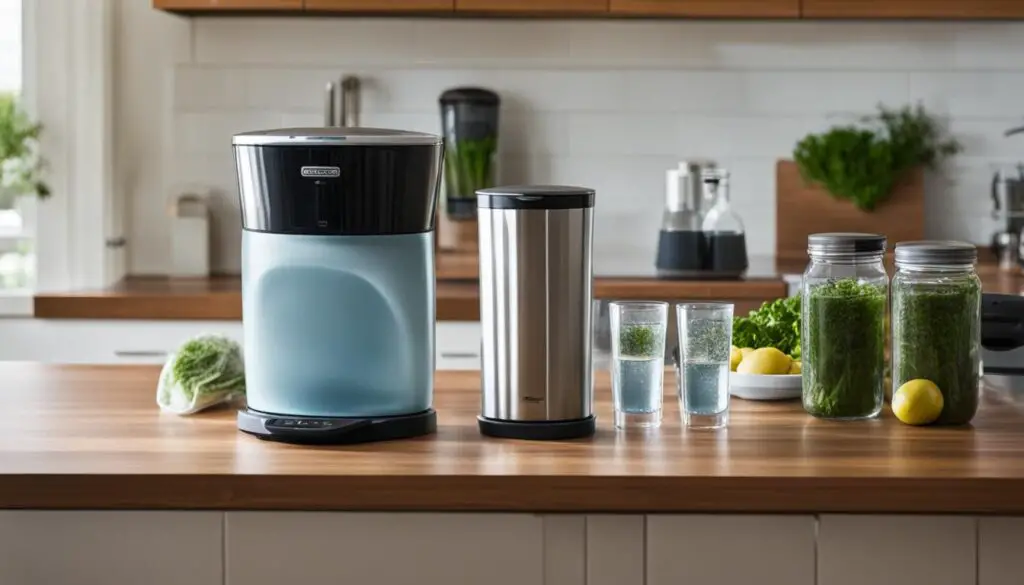
Conclusion
In conclusion, DIY filtration solutions offer a sustainable and energy-efficient option for marine aquarium filtration systems. These solutions not only provide cost-effective alternatives to traditional systems but also promote environmental sustainability. By taking into consideration factors such as waste generation, energy consumption, and water usage, individuals can make informed choices that contribute to a greener future.
One example of an eco-friendly DIY filtration option is the Berkey water filter. Made from durable stainless steel, the Berkey filter offers a long filter lifespan and reduced environmental impact compared to disposable filters. By utilizing DIY filtration solutions like the Berkey filter, individuals can ensure access to clean water while minimizing their carbon footprint and promoting sustainability.
When it comes to energy-efficient marine aquarium filtration systems, DIY filtration solutions are a viable choice. By adopting these sustainable alternatives, individuals can have peace of mind knowing that they are reducing their environmental impact while still maintaining the cleanliness and quality of their aquarium water.
FAQ
Are DIY water filters sustainable and effective for marine aquarium filtration systems?
Yes, DIY water filters offer energy-efficient and sustainable options for marine aquarium filtration systems. They provide cost-effective and eco-friendly alternatives to traditional systems, contributing to a greener future.
What factors should I consider when assessing the environmental impact of DIY water filters?
When evaluating the sustainability of DIY water filters, it is important to consider factors such as waste generation, energy consumption, and water usage. These factors play a crucial role in determining the environmental impact of DIY filters.
What are the environmental benefits and drawbacks of DIY filtration methods?
DIY filtration methods offer several environmental benefits, including cost-effectiveness, reduced plastic waste, and a lower carbon footprint. However, they may have limitations in effectively removing certain contaminants and lack standardized testing procedures for water quality assurance. Regular maintenance can also be time-consuming compared to commercial systems.
What are the key takeaways of eco-conscious DIY water filtration systems?
Eco-conscious DIY water filtration systems, such as activated carbon filters, ceramic filters, and reverse osmosis systems, offer cost-effective and customizable options with a reduced carbon footprint. These systems utilize readily available and affordable materials, providing an eco-friendly solution for accessing clean drinking water.
What makes the Berkey water filter an eco-friendly option?
The Berkey water filter is an eco-friendly option due to its stainless steel construction, which makes it more durable and long-lasting compared to plastic alternatives. It is BPA-free and has a longer lifespan than disposable filters, reducing waste and environmental impact. Additionally, the cost per gallon of filtered water is significantly lower than buying bottled water.
How do DIY filtration solutions contribute to sustainability?
DIY filtration solutions offer individuals the opportunity to reduce their carbon footprint and promote sustainability. By considering factors such as waste generation, energy consumption, and water usage, individuals can make informed choices that minimize their environmental impact while ensuring access to clean water.

